
"I gave you a little culture lesson there about Geordie culture," chuckles Sam Fender down the phone-line, after having educated me about stottie bread ("That's a Geordie bread - it's basically a disc of white bread") and local bakery chain Greggs for the last few minutes. He's entertaining and endearing, but also one of Great Britain's brightest hopes as the winner of this year's Critics' Choice Award at the BRIT Awards, and burning the candle at both ends with a relentless touring schedule that unfortunately took a toll on his voice and saw Fender having to pull out of festival season (including a highly coveted Glastonbury slot) earlier this year to recover from illness.
Now, Fender is back in fighting form ("We'd done too many shows and had been non-stop touring for two years, but we're back on the horse now!"), and finds himself in Sydney at the time of our call for a Splendour In The Grass side-show, ahead of the release of his take-no-prisoners debut album 'Hypersonic Missiles', which he's the sole writer of. I remind Fender that he needs to keep hydrated during this crucial time. "Hydrated! That's the one I really need to keep an eye on; I need to make sure I drink water every two seconds. I've just had a coffee, so I'd better get a water down me," he mutters, before we launch into discussing everything from the gentrification of small towns to toxic masculinity and the need for environmental radicalism.
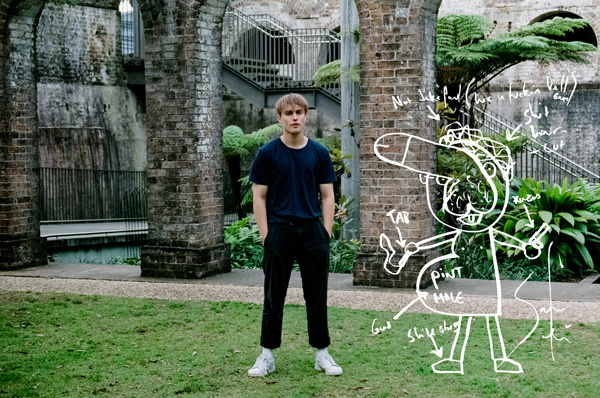
I think we have to make a conscious effort as men, especially, to make sure that we're not falling into old habits and standing on the wayside and letting things happen. There's a lot of things we need to actually correct in our upbringing, especially in regards to things like toxic masculinity and stuff like that, I know for a fact that there were loads of different times in my childhood where I was told bogus bullshit things like 'boys don't cry'...

COUP DE MAIN: We were sad you weren't able to come to New Zealand with Mumford & Sons' Gentlemen Of The Road festival earlier this year. Do you have any plans upcoming to visit us?
SAM FENDER: Definitely. My godfather is from there - he lived there for the first seventeen years of his life and went to high school there and everything, and then he moved to North Shields with his parents when he was seventeen; bless him, and then he became best mates with my dad. While I've been growing up, he's almost been like a father to me as well.
CDM: You'll have to come visit with your godfather!
SAM: Definitely. 100%! He's got a lot of old friends over there.
CDM: Is there a song on your debut album 'Hypersonic Missiles' that you're most excited about fans getting to hear?
SAM: I'm quite excited for people to hear 'The Borders' - that's the second track from the album and it's the first time I've written a song that's based on my own experiences, as opposed to pointing fingers at things on the news. The majority of singles I've released recently were more social commentary, but now I've crossed over to talking about... moi! It's been quite exciting, because I find it quite a hard to thing to do. It's quite hard to be 100% honest about yourself. It's very easy to be honest about other people because I can be brutal and I can point fingers at them, but then when you're writing about yourself it's really exposing and makes you feel quite naked. Most people do write about themselves all the time, but I've always found it quite a hard thing to do.
CDM: Well, it's like holding a mirror up to yourself, basically.
SAM: Yeah, and I don't like that. <laughs> I don't like looking in the mirror, so maybe that's why I don't like writing them sorts of songs. But I'm getting there!

CDM: One of my favourite moments on your album is in 'White Privilege' when you lay it all out and say: "The patriarchy is real, the proof is here in my song / I'll sit and mansplain every detail of the things it does wrong / 'Cause I'm a white male, full of shame / My ancestry is evil, and their evil is still not gone."
SAM: It's ironic as fuck. <laughs> That's essentially me pointing out the fact that it's definitely easier for me in this industry, considering I'm a blonde blue-eyed white boy. Radio X have a list in the UK called the Top 100 UK songs - it's fan-voted, so it wasn't Radio X picking it themselves; I believe it was fan-voted anyway, but even then it just goes to show the attitude of certain listenerships - and I wrote it around the same time that three of my songs were in the Top 100 and there were only three female artists that had songs in the Top 100. So I singlehandedly had the same amount in the Top 100 as all the female artists combined. I was like, 'Well, clearly, that's fucking bullshit.' So it just goes to show that there is still a massive inequality, even in our thinking - subconsciously we're still quite sexist.
CDM: Being so self-aware, does that affect you on a day-to-day basis and/or with decisions that you make?
SAM: I'm not a perfect person at all by a long stretch. I'm very, very flawed and I think you have to make a conscious effort now in this world. We're in such a pivotal moment in time, where so many things are changing in the sense of racial equality and gender equality; there's a lot of movements to push for that, and I think we have to make a conscious effort as men, especially, to make sure that we're not falling into old habits and standing on the wayside and letting things happen. There's a lot of things we need to actually correct in our upbringing, especially in regards to things like toxic masculinity and stuff like that, I know for a fact that there were loads of different times in my childhood where I was told bogus bullshit things like 'boys don't cry' and stuff like that. And I do believe that toxic masculinity and all of that affects gender equality - if you don't have these strong parameters of what being a man is, like overtly masculine upbringings. There's nothing wrong with masculinity, but what I'm trying to say is that if you're brought up to be a douchebag with no emotions, then you're probably not going to give a fuck about what women are getting paid. You have to make a conscious effort to be aware. And not even just because of the times, but just in general, you have to have a conscious effort about what you're doing. Because if you don't, you could quite easily become a c*nt without you realising, which I think I've done before.
CDM: Do you think there's hope for our generation? Will things get better?
SAM: Definitely. I think we've got to try, haven't we? Things have been bad in the past and humanity seems to pull itself out of it. With the whole environmental thing, that's pretty worrying. Greta Thunberg from Sweden, it says something doesn't it, when it takes a little kid to get the world talking.
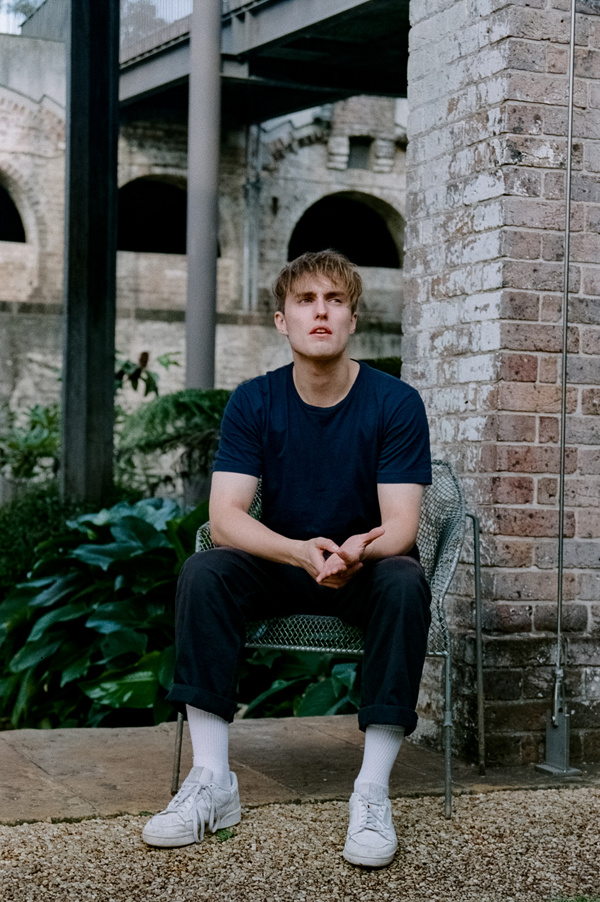
CDM: 'Dead Boys' is a really important song in how it helps shed light on the issues around toxic masculinity, mental health, and male suicide. Why do you think it's important to normalise conversations around these issues and break down the social stigma surrounding them?
SAM: Well, I think you just answered the question yourself. You have to break down the social stigma or else we're never going to be able to talk about it. It's as simple as that, really. People don't really talk about it and there's lots of boys killing themselves in my country. 84 men take their lives a week in the UK, which is insanity because it's a small island and it's the biggest killer of men under the age of 45 in the UK - it kills men more than cancer and car accidents and murder and live crimes. And why are men killing themselves so much? To be honest, as someone who has experienced mental health problems and has mental health problems that run in his family, and has a lot of friends with mental health problems as well, I know how hard it is to get help. Or how hard it is to communicate when you've been brought up in North Shields, or been brought up in a blue-collar town in England. There's that very stiff upper lip attitude that still runs through a lot of people's families; that British thing of 'chin up and crack on'.
CDM: In "Dead Boys' you sing, "Everybody 'round here just drinks / That's our culture." Do you see a future where society will one day move away from binge-drinking, lad-culture and also what you talk about in 'Friday Fighting'? Or is it unavoidable due to socioeconomics and people wanting to escape their reality?
SAM: England is particularly bad for binge-drinking. I didn't realise that Britain is actually one of the worst places for over consumption of alcohol and being total binge-drinkers; it's just our thing. I used to work in a pub before I got found by my manager and I used to drink every day. I drank every day from the age of probably seventeen-and-a-half to eighteen, like the back end of my college years, I was drinking every single day regardless, because I was working two jobs in a restaurant and in a pub, and I was trying to do my A Levels at the same time; but I didn't get them done because I was pissed. And then I spent my time in the pub, I'd drink every day, and that was normal. It became completely normal because everyone around me drunk every day, and my parents drunk pretty much every day - so when you come from a place where it's normal, it doesn't seem to be a problem, but then you realise that actually a lot of people self-medicate with alcohol and the reason why they're itching to get a drink at five o'clock in the afternoon, is actually because they're itching to just get an escape.

CDM: 'Leave Fast' perfectly encapsulates the claustrophobia of small towns and feelings of entrapment by your circumstances. New Zealand has a small population of only 4.8 million--
SAM: Yeah, tiny!
CDM: And an issue that we are facing is a 'brain drain' where our most talented youth immigrate overseas in search of better employment opportunities and don't return. I imagine that your hometown North Shields must be similar, where those that leave do not return? What do you think is the future of these small towns where the populations are ageing more and more?
SAM: It kind of depends, man. I wrote that song from around the time when I was eighteen, so just after college, and everybody I knew who was good at stuff went off to university. So all of my friends disappeared and then I didn't go to university; I just went and worked at a pub. I was sort of stuck in my dad's town and stuck in my old man's life. There was nobody there that I could really relate to, so I felt trapped there. I don't know what will become of these towns, but I can tell you what's happening to mine. In my town, now there's a load of people from the posh end of town; a small little section called Tynemouth, and it's getting kind of gentrified. It's really weird, because it's taken away the fishing community where my town was born from, and is essentially being kind of swallowed up by gin bars and Mexican taco restaurants. It's weird! It went from being really blue-collar, and now in North Shields in the Fish Quay part which used to be the epicentre of working men and a classic blue-collar place, it has started to become more like Tynemouth. Sometimes these places just get swallowed up by gentrification.
CDM: In 'White Privilege' you say, "I'm not entirely sure the nitpicking can count as progression." How do you think real progress or change can be made? Or what needs to happen first for progress to be able to happen?
SAM: What I meant by the nitpicking is when people are nitpicking about little solutions to big problems. Like banging on about everything from people complaining about semantics in the names of things like manhole cover or Manchester; "We can't call it that because it's gender specific." That's nitpicking. You could also argue that nitpicking is also Earthling Ed going to a farmer and telling him that he's a fuckhead for killing pigs, to try and save the planet. Don't bother going to the farm, go to the government. Hit the problem at the source. Rally your people and go and protest in front of the government, instead of kicking off at some farmer in the middle of Yorkshire who only knows that way of life. It just comes across as condescending and arrogant, as opposed to progressive. Most of the things that Earthling Ed says I actually agree with, even though I'm not a vegan yet, but I do think that I'm going to try and do something with my diet because I think we've probably got some sort of obligation to the next generation. If we care about our kids, we've got to try and do something, haven't we? So I'm going to try. It's more about regardless of whether people change their diet and go vegan and stuff like that, it's actually the government that needs to do it - if the government don't get behind changing things for climate change, then it's never going to change, because they're the people that control the economy and the amount of fossil fuel that we're creating. So they need to do it. It needs to be a mass government movement.

CDM: Do you have a favourite song lyrically on your album?
SAM: Lyrically, I'd probably say it's a really early song I wrote because I was proud I wrote it when I was nineteen/twenty, and it's a song called 'Two People' which is about domestic violence; I could hear it from the walls where I was growing up. I had some neighbours and it was pretty gnarly because I'd be trying to get to sleep and I could hear all of this commotion going on upstairs, so I wrote this song about them when I was a kid, and now it's made it onto the album even though it was five years ago when I wrote that.
CDM: I almost cried listening to 'Two People' for the first time. It's heartbreaking. I know you haven't performed it live yet, but when you're playing songs like that live which are so emotionally stirring, do you find it harder or easier than a song like 'Call Me Lover'?
SAM: 'Call Me Lover' is just a pop song that I wrote when I was nineteen. I actually didn't want to put it on the album. <laughs> I got my arm twisted to put it on the album because they were like, "It's a single! You've got to!"
CDM: "Do it for radio, Sam!"
SAM: It was one of those situations. One of the guys at the label was like, "It's the difference between a gold and a platinum." I was like, "For fuck's sake. If this doesn't go platinum, then you've got a lot to fucking answer for." But 'Call Me Lover', I genuinely wrote that song in five minutes, if that, before I went onstage at a gig when I was nineteen. And then I went onstage and played it. And then everybody in the room was like, "What was that song?!" So I was like, 'Oh, that was a good song then,' and then I kept it. And I kept it for six years, and now it's ended up going on the album because it's got a catchy chorus. But yeah, it doesn't stir me up in the same way that 'Dead Boys' would.

CDM: In the second verse of 'That Sound', when you say, "Loaded vampires butter me up / Drop names and sniff up residue while boasting ´bout their revenue," are you referring to your own personal experiences with music industry executives?
SAM: Yep! <laughs> It's pretty straight up, isn't it? I had a lot of experience with A&R men for five or six years, because no-one wanted to sign me when I was eighteen/nineteen. Nobody really gave a shit, and that's fine. But after I did this show when I was nineteen, everyone was doing gear and they were all full of gak, but it was more than just them, there were a couple of characters back home who were all coke heads and doing really well with their lives and were just boasting about it in the bar, so it was a mixture of the two - I was talking about all of these people that want to talk to you once you start doing well.
CDM: You seem to be suffering a bit from insomnia in 'That Sound' and 'You’re Not The Only One'. What's keeping you awake?
SAM: My head! <laughs> My brain is constantly-- The neurones are constantly firing a lot and I can't get to sleep.
SAM: The lyric, "But I believe in what I'm feeling, and I'm firing for you," in 'Hypersonic Missiles' is a really beautiful sentiment. Do you think love is the strongest human emotion?
CDM: I'd like to think so, but I think hate is giving it a run for its money at the moment.
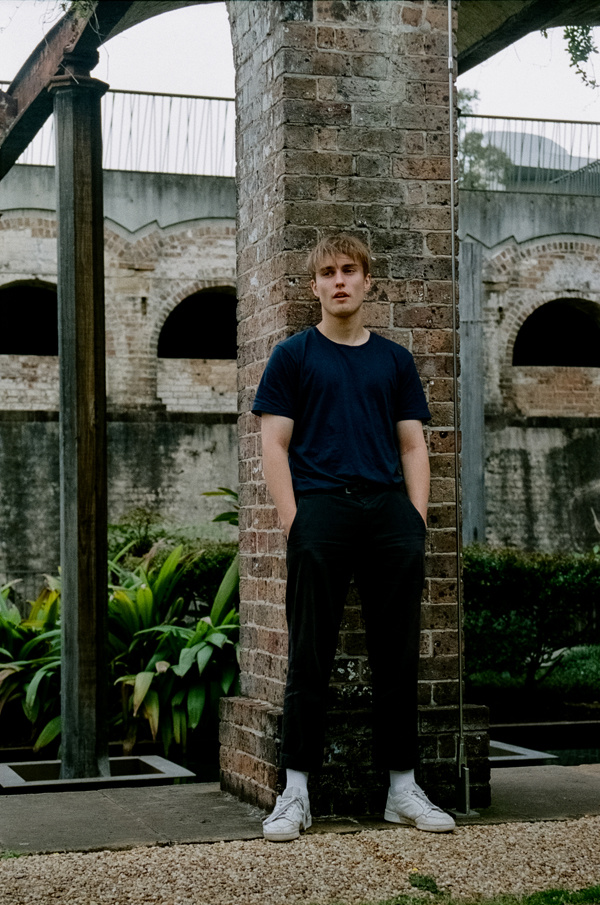
CDM: What was it like working with John Waugh on 'Hypersonic Missiles'?
SAM: Just like any other day at the office. He's from my hometown, so I'd known him from before he joined The 1975['s touring band]. He was friends with my brother and played saxophone with my brother who used to be in different bands with him back in the day when they were kids. And Waugh just used to be this little dorky cute kid with a saxophone when he was nineteen, and now he's an international rockstar who tours the world with The 1975.
CDM: True or false: The 1975's Matty Healy once judged a talent competition that you won?
SAM: True.
CDM: Tell me more, please.
SAM: It was a Teenage Cancer Trust competition when I was sixteen. Matty Healy was one of the judges, and it was just before The 1975 became The 1975, they were actually called Drive Like I Do at the time. And I think Matt got pulled in by his mother, because his mam had a friend called Angie Jenkinson who ran the Teenage Cancer Trust, who I'm really good friends with, and it was just one of those connections. His parents are both really famous Geordies, they're two actors from Newcastle, and Newcastle has this kind of Illuminati of famous people who are all connected - we call it the Geordie Mafia, and whoever's in the Geordie Mafia, Matty Healy got pulled in through that. So I did this competition and won at the end. I met him then when I was sixteen and we were both secret smokers, so both of us were hiding around the corner, hiding from our parents, but I was sixteen so I think that was kind of normal. But yeah, he's a nice guy and I saw him at the BRITs not long ago. He's a very busy, busy man, so you don't often see him, but he was lovely. I said to him at the BRITs, "God this is fucking insane, this is a bit mental." And he put his hand on my shoulder and said, "Get used to it." <chuckles>
CDM: Agreed! You should! You have a great album that everyone is going to love, Sam!
SAM: Thank you!
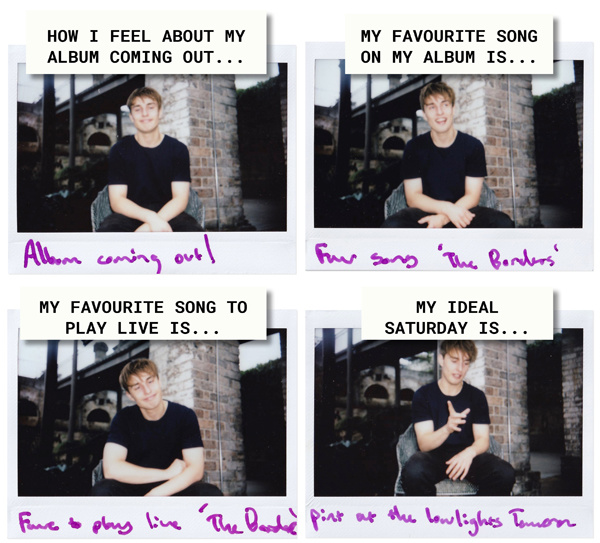
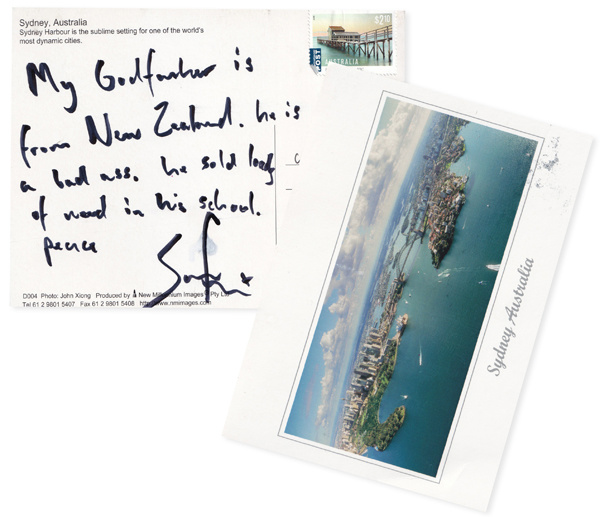
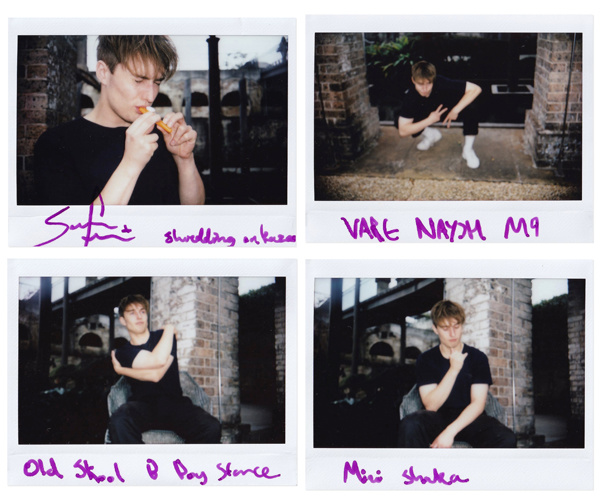
Sam Fender's debut album 'Hypersonic Missiles' is out now - click here to purchase.
Watch the 'Will We Talk?' music video below:

